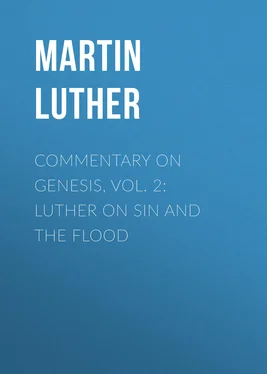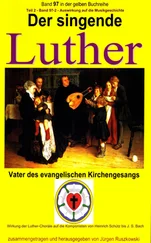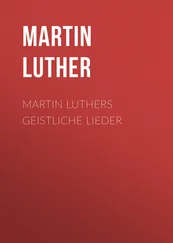Martin Luther - Commentary on Genesis, Vol. 2 - Luther on Sin and the Flood
Здесь есть возможность читать онлайн «Martin Luther - Commentary on Genesis, Vol. 2 - Luther on Sin and the Flood» — ознакомительный отрывок электронной книги совершенно бесплатно, а после прочтения отрывка купить полную версию. В некоторых случаях можно слушать аудио, скачать через торрент в формате fb2 и присутствует краткое содержание. Жанр: foreign_prose, foreign_religion, Философия, foreign_psychology, foreign_antique, на немецком языке. Описание произведения, (предисловие) а так же отзывы посетителей доступны на портале библиотеки ЛибКат.
- Название:Commentary on Genesis, Vol. 2: Luther on Sin and the Flood
- Автор:
- Жанр:
- Год:неизвестен
- ISBN:нет данных
- Рейтинг книги:4 / 5. Голосов: 1
-
Избранное:Добавить в избранное
- Отзывы:
-
Ваша оценка:
- 80
- 1
- 2
- 3
- 4
- 5
Commentary on Genesis, Vol. 2: Luther on Sin and the Flood: краткое содержание, описание и аннотация
Предлагаем к чтению аннотацию, описание, краткое содержание или предисловие (зависит от того, что написал сам автор книги «Commentary on Genesis, Vol. 2: Luther on Sin and the Flood»). Если вы не нашли необходимую информацию о книге — напишите в комментариях, мы постараемся отыскать её.
Commentary on Genesis, Vol. 2: Luther on Sin and the Flood — читать онлайн ознакомительный отрывок
Ниже представлен текст книги, разбитый по страницам. Система сохранения места последней прочитанной страницы, позволяет с удобством читать онлайн бесплатно книгу «Commentary on Genesis, Vol. 2: Luther on Sin and the Flood», без необходимости каждый раз заново искать на чём Вы остановились. Поставьте закладку, и сможете в любой момент перейти на страницу, на которой закончили чтение.
Интервал:
Закладка:
255. As regards the names of Cain's offspring, I believe that, in common with those of the holy patriarchs, they indicate not an absence of purpose or a random selection, but a definite purpose and a prophecy. Thus "Adam" signifies a man of, or taken out of, the red earth. "Eve" signifies the mother of life, or of the living. "Cain" signifies possession. "Abel" signifies vanity. And we find that also among the Gentiles many names have such a significance; not seldom names are found which are truly prophetic. "Enoch" is a prophetic name, expressive of hope in the future as a relief to Cain's mind, or rather to his wife's, for it was the latter who called the son she bore Enoch, from the Hebrew Hanach , which signifies, "she dedicated," or "she devoted."
256. This is a word frequently used by Moses. As when he says, "What man is there that hath built a new house, and hath not dedicated it? let him go and return to his house, lest he die in the battle, and another man dedicate it," Deut 20, 5. The verb in this passage, which signifies originally to dedicate, here signifies to possess, or to enjoy; and when this possession or enjoyment begins, it is attended with happy signs and auspicious invocations. So when the wife of Cain brought forth her first son, she said to her husband, Enoch; that is, "Dedicate him, devote him:" for the verb is in the imperative mood. As if Cain had said himself, May this our beginning be happy and prosperous. My father Adam cursed me on account of my sin. I am cast out of his sight. I live alone in the world. The earth does not yield me her strength; she would be more fruitful to me, had I not thus sinned. And yet God now shows me uncovenanted mercy in giving me this son. It is a good and happy beginning.
As in the generation of Cain the corporal blessings begin with Enoch, so it is another Enoch in the generation of the righteous under whom religion and spiritual blessings begin to flourish.
257. That which is added by Moses concerning the city Cain thus built belongs to history. But I have before observed that Cain, when separated from the true church and driven into banishment, hated the true church. When, therefore, Cain thus first built a city, that very act tended to show that he not only disregarded and hated the true Church, but wished also to oppose and oppress it. For he reflects thus: Behold I am cast out by my father and I am cursed by him, but my marriage is not a barren one; therefore I have in this the hope of a great posterity. What, therefore, is it to me that I am driven by my father from beneath his roof? I will build a city, in which I will gather a church for myself. Farewell, therefore, to my father and his church. I regard them not.
258. Accordingly, it is not through fear, or for defense, that Cain "built a city," but from the sure hope of prosperity and success, and from pride and the lust of dominion. For he had no need whatever to fear his father and mother, who at the divine command had thrust him out to go into some foreign land. Nor had he any more ground of fear from their children than from themselves. But Cain was inflated with pride through this uncovenanted mercy of God, as I have termed it; and, as the world ever does, he sought by means of his "city" an opportunity of emerging from his present state into future greatness. The sons of God, on the contrary, are only anxious about another city, "which hath foundations, whose builder and maker is God," as we have it described in the Epistles to the Hebrews 11, 10.
V. 18a. And unto Enoch was born Irad.
259. What opinion to form concerning this name, I really know not, for its origin is very obscure; and yet I believe the name is not accidental but prophetic. In the book of Joshua we have a city called Ai; and this same term is used elsewhere as an appellative. Now, the proper name Ai signifies, "a heap," as a heap of fallen buildings. And if with this name you compound the verb Irad , the word thus compounded will signify increase. Although the posterity of Cain, on account of their excommunication, were at that time like a great heap of ruins, it was his prayer that they might not altogether perish, but be preserved and greatly increased by means of this son Irad. If anyone can offer a better interpretation, I will by no means despise it; for on obscure points like the present, conjecture is quite allowable.
V. 18b. And Irad begat Mehujael.
260. This name is formed from the verb mahah , which signifies "to destroy," and from jaal , "he began," or "he attempted or dared." Accordingly this name signifies that the posterity of Cain should now enter upon so mighty an increase as to dare to set itself in array against the true Church and to despise it and persecute it; so mightily should it prevail by its wealth, wisdom, glory and numbers. These, indeed, are for the most part the influences through which the true Church is always overcome by the world and the false church.
V. 18c. And Mehujael begat Methushael.
261. Meth signifies "death," and schaal means "to ask," or "to demand." Hence we have the name Saul; that is, demanded. This name indicates a spirit haughtier than any of the others. I understand it to signify that Methushael threatens that he will avenge his parents, who are dead, whom the other church—that is the true Church—has punished with excommunication and exile.
V. 18d. And Methushael begat Lamech.
262. Hitherto the Cainites seem to have insulted the true Church with impunity and to have triumphed over them. But the name "Lamech" signifies that God, at the time in which Lamech was born, inflicted on the posterity of Cain their due punishment. The name Lamech is derived from the verb makak , which signifies to humble, to diminish, to suppress. Or, it may be understood actively, to mean that in the time of Lamech the posterity of Cain so greatly increased that the true Church was quite overwhelmed by them.
263. Such was the posterity of Cain; men, no doubt, renowned for their wisdom and greatness. And I also believe that some of them were saved by the uncovenanted mercy of God, as I have above explained. But far the greater part of them most bitterly hated and persecuted the true Church. They could not brook inferiority to the sons of Adam, the true Church; therefore they set up their own forms of worship, and introduced many other new things for the sake of suppressing the church of Adam. And because the false church was thus kept separate from the true Church, I believe that Cain married to each other his sons and daughters. Accordingly, about the time of Lamech, Cain's posterity began to multiply exceedingly. And it is for this reason, I believe, that Moses here terminates the list.
V. 19. And Lamech took unto him two wives; the name of the one was Adah, and the name of the other Zillah.
264. Here again a twofold question arises. In the first place divines dispute whether Lamech married these two wives on account of lustful passion or for some other cause. My belief is that polygamy was not entered into for the sake of lust, but with the object of increasing his family, and from the lust of dominion, and especially so if, as his name imports, the Lord at that time had been punishing the Cainites, or the posterity of Cain, by pestilence, or by some other calamity. In this case, Lamech probably thought by such expedient to retrieve his greatness. Thus barbarous nations retain polygamy to strengthen and establish both home and State.
265. As regards the names of these two wives, the name of one is Adah; that is, adorned, or, having chains on the neck. Adi signifies a neat, or elegant woman, and adah , the verb, signifies to adorn, or, to put on. And perhaps this name was given to her, not only because she was the mistress of the house, elegantly adorned or clothed, but because she was also beautiful. The name of the other wife, Zillah, signifies, his shade.
Читать дальшеИнтервал:
Закладка:
Похожие книги на «Commentary on Genesis, Vol. 2: Luther on Sin and the Flood»
Представляем Вашему вниманию похожие книги на «Commentary on Genesis, Vol. 2: Luther on Sin and the Flood» списком для выбора. Мы отобрали схожую по названию и смыслу литературу в надежде предоставить читателям больше вариантов отыскать новые, интересные, ещё непрочитанные произведения.
Обсуждение, отзывы о книге «Commentary on Genesis, Vol. 2: Luther on Sin and the Flood» и просто собственные мнения читателей. Оставьте ваши комментарии, напишите, что Вы думаете о произведении, его смысле или главных героях. Укажите что конкретно понравилось, а что нет, и почему Вы так считаете.












